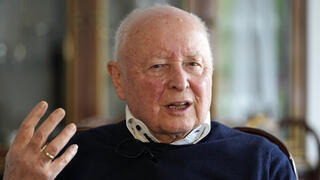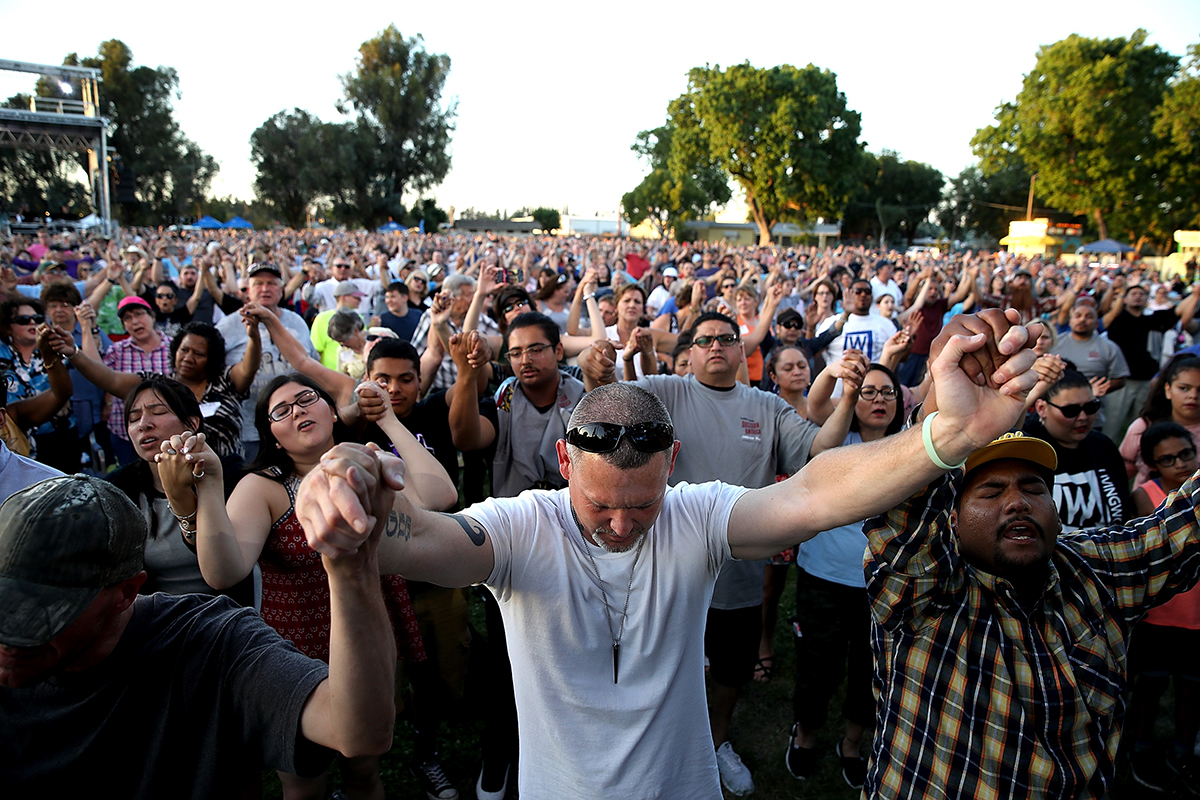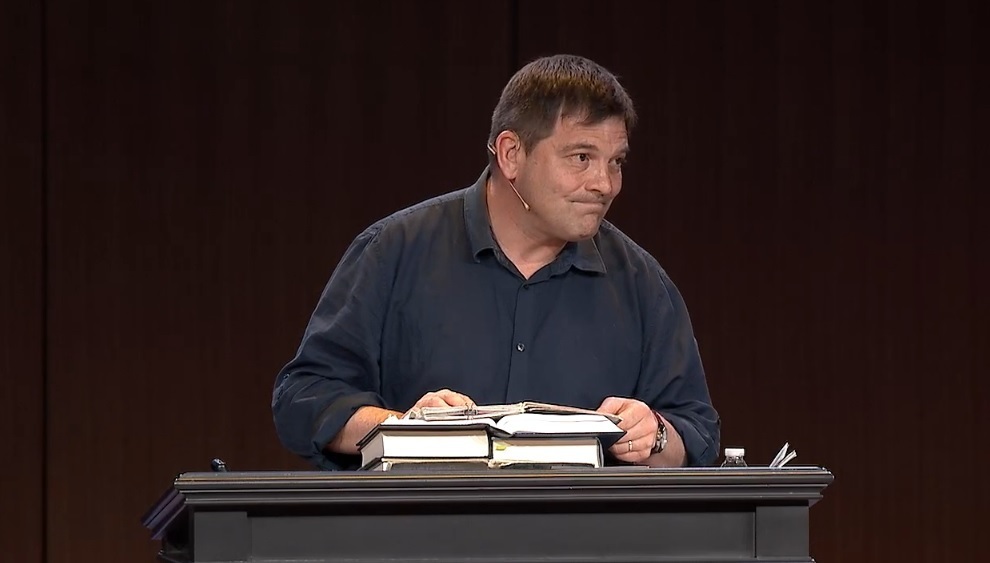Searched: Grow
News
Amid the continued declines, Southern Baptists are celebrating back-to-back years of growth in worship attendance and baptism.
 Despite years of record-setting declines shrinking the Southern Baptist Convention (SBC) to its lowest membership in nearly half a century, Southern Baptists have begun to see some signs of life within their 46,906 churches.Worship attendance, small group attendance, and baptisms were up last year in the SBC’s annual statistical report, released Tuesday, while membership fell below 13 million.2023 marks 17 straight years of decline for the country’s biggest Protestant denomination. It’s down 3.3 million from its peak, with the steepest drops coming during the pandemic. The SBC lost 1.3 million members between 2020 and 2022 alone.Beyond COVID-19 disruptions, Southern Baptists have recently confronted some contentious issues within their convention, responding to sexual abuse and clamping down on female preachers, which have led some congregations to leave the SBC (including prominent megachurch Saddleback Church).But statistics indicate that church departures aren’t a significant driver of membership decline; the SBC was down 292 churches last year, just 0.63 percent of its total.In 2023, membership fell by 241,000, its smallest decrease since 2018. Yet attendance at SBC churches increased 6.5 percent, reaching above 4 million a week for the first time since the pandemic.Attendance at small groups and Bible studies ticked up 4 percent to 2.4 million.With fewer Americans than ever attending church and religious disaffiliation on the rise, leaders see even small increases in engagement and discipleship as worth celebrating.It’s the first time in over a decade that SBC worship attendance has grown two years in a row, though it still lags behind pre-pandemic numbers. Back in ...Continue reading... Despite years of record-setting declines shrinking the Southern Baptist Convention (SBC) to its lowest membership in nearly half a century, Southern Baptists have begun to see some signs of life within their 46,906 churches.Worship attendance, small group attendance, and baptisms were up last year in the SBC’s annual statistical report, released Tuesday, while membership fell below 13 million.2023 marks 17 straight years of decline for the country’s biggest Protestant denomination. It’s down 3.3 million from its peak, with the steepest drops coming during the pandemic. The SBC lost 1.3 million members between 2020 and 2022 alone.Beyond COVID-19 disruptions, Southern Baptists have recently confronted some contentious issues within their convention, responding to sexual abuse and clamping down on female preachers, which have led some congregations to leave the SBC (including prominent megachurch Saddleback Church).But statistics indicate that church departures aren’t a significant driver of membership decline; the SBC was down 292 churches last year, just 0.63 percent of its total.In 2023, membership fell by 241,000, its smallest decrease since 2018. Yet attendance at SBC churches increased 6.5 percent, reaching above 4 million a week for the first time since the pandemic.Attendance at small groups and Bible studies ticked up 4 percent to 2.4 million.With fewer Americans than ever attending church and religious disaffiliation on the rise, leaders see even small increases in engagement and discipleship as worth celebrating.It’s the first time in over a decade that SBC worship attendance has grown two years in a row, though it still lags behind pre-pandemic numbers. Back in ...Continue reading... |
Tony Perkins and Tim Barton, from Wallbuilders, visit with Chris Salcedo about Antisemitism on college campuses and the failure of the university system. They also talked about the growing vandalism and social unrest across the country....
|
Amid the continued declines, Southern Baptists are celebrating back-to-back years of growth in worship attendance and baptism.
 Despite years of record-setting declines shrinking the Southern Baptist Convention (SBC) to its lowest membership in nearly half a century, Southern Baptists have begun to see some signs of life within their 46,906 churches.Worship attendance, small group attendance, and baptisms were up last year in the SBC’s annual statistical report, released Tuesday, while membership fell below 13 million.2023 marks 17 straight years of decline for the country’s biggest Protestant denomination. It’s down 3.3 million from its peak, with the steepest drops coming during the pandemic. The SBC lost 1.3 million members between 2020 and 2022 alone.Beyond COVID-19 disruptions, Southern Baptists have recently confronted some contentious issues within their convention, responding to sexual abuse and clamping down on female preachers, which have led some congregations to leave the SBC (including prominent megachurch Saddleback Church).But statistics indicate that church departures aren’t a significant driver of membership decline; the SBC was down 292 churches last year, just 0.63 percent of its total.In 2023, membership fell by 241,000, its smallest decrease since 2018. Yet attendance at SBC churches increased 6.5 percent, reaching above 4 million a week for the first time since the pandemic.Attendance at small groups and Bible studies ticked up 4 percent to 2.4 million.With fewer Americans than ever attending church and religious disaffiliation on the rise, leaders see even small increases in engagement and discipleship as worth celebrating.It’s the first time in over a decade that SBC worship attendance has grown two years in a row, though it still lags behind pre-pandemic numbers. Back in ...Continue reading... Despite years of record-setting declines shrinking the Southern Baptist Convention (SBC) to its lowest membership in nearly half a century, Southern Baptists have begun to see some signs of life within their 46,906 churches.Worship attendance, small group attendance, and baptisms were up last year in the SBC’s annual statistical report, released Tuesday, while membership fell below 13 million.2023 marks 17 straight years of decline for the country’s biggest Protestant denomination. It’s down 3.3 million from its peak, with the steepest drops coming during the pandemic. The SBC lost 1.3 million members between 2020 and 2022 alone.Beyond COVID-19 disruptions, Southern Baptists have recently confronted some contentious issues within their convention, responding to sexual abuse and clamping down on female preachers, which have led some congregations to leave the SBC (including prominent megachurch Saddleback Church).But statistics indicate that church departures aren’t a significant driver of membership decline; the SBC was down 292 churches last year, just 0.63 percent of its total.In 2023, membership fell by 241,000, its smallest decrease since 2018. Yet attendance at SBC churches increased 6.5 percent, reaching above 4 million a week for the first time since the pandemic.Attendance at small groups and Bible studies ticked up 4 percent to 2.4 million.With fewer Americans than ever attending church and religious disaffiliation on the rise, leaders see even small increases in engagement and discipleship as worth celebrating.It’s the first time in over a decade that SBC worship attendance has grown two years in a row, though it still lags behind pre-pandemic numbers. Back in ...Continue reading... |
Our apologetics must evolve to engage with the new cultural mood of the next generations.
 For years now, scholars have announced the death of postmodernism. After decades of dominance as a cultural mood, the famously cynical and relativistic intellectual stance is finally out. In its place, another ideological outlook is taking hold—as those of us who spend significant time with the next generations (Z and Alpha) may have noticed.So, the question is this: What fresh dispositions of thought are taking hold—and how might Christians engage well with our evolving cultural frontier?One term that scholars have used to identify the new cultural mood is metamodernism. First used in 1975 to describe a literary shift, the concept became more prominent in the early 2000s thanks to the work of cultural analysts Timotheus Vermeulen and Robin van den Akker. In their 2010 article, “Notes on Metamodernism,” they made a convincing case for the new zeitgeist and provided a cultural analysis of its characteristics.Metamodernism, according to Vermeulen and Van Den Akker, is a “structure of feeling” marked by “(often guarded) hopefulness and (at times feigned) sincerity”—deriving from a realization that “history is moving rapidly beyond its much proclaimed end.” While there are plenty of academic responses to their work, the term has gained little traction in the public sphere.As a high school teacher, youth pastor, and an older member of Gen Z myself, I’ve not only grown up breathing the ideological air of metamodernism but have also seen what it looks like on the ground. It can manifest in a few tangible ways, including in what I call apocalyptic hope, inverted worldview-building, and highly narrated identities.Apocalyptic hope (or what Vermeulen and Van Den ...Continue reading... For years now, scholars have announced the death of postmodernism. After decades of dominance as a cultural mood, the famously cynical and relativistic intellectual stance is finally out. In its place, another ideological outlook is taking hold—as those of us who spend significant time with the next generations (Z and Alpha) may have noticed.So, the question is this: What fresh dispositions of thought are taking hold—and how might Christians engage well with our evolving cultural frontier?One term that scholars have used to identify the new cultural mood is metamodernism. First used in 1975 to describe a literary shift, the concept became more prominent in the early 2000s thanks to the work of cultural analysts Timotheus Vermeulen and Robin van den Akker. In their 2010 article, “Notes on Metamodernism,” they made a convincing case for the new zeitgeist and provided a cultural analysis of its characteristics.Metamodernism, according to Vermeulen and Van Den Akker, is a “structure of feeling” marked by “(often guarded) hopefulness and (at times feigned) sincerity”—deriving from a realization that “history is moving rapidly beyond its much proclaimed end.” While there are plenty of academic responses to their work, the term has gained little traction in the public sphere.As a high school teacher, youth pastor, and an older member of Gen Z myself, I’ve not only grown up breathing the ideological air of metamodernism but have also seen what it looks like on the ground. It can manifest in a few tangible ways, including in what I call apocalyptic hope, inverted worldview-building, and highly narrated identities.Apocalyptic hope (or what Vermeulen and Van Den ...Continue reading... |
An ancient codex, containing perhaps the earliest complete versions of Jonah and 1 Peter, goes up for auction in June. Will it disappear?
 One of the oldest books in existence, which contains what is perhaps the oldest complete versions of Jonah and 1 Peter, is going up for auction in June. The sale of the Crosby-Schøyen Codex has scholars excited to talk about its uniqueness—and nervous about whether it could go into private hands and disappear.The Crosby-Schøyen Codex is a primary example of the invention of books, which coincided with the spread of Christianity, said Eugenio Donadoni, a specialist in books and manuscripts at Christie’s London, which is auctioning the codex. The growth of Christianity spurred the need to “maximize the text you can write down and transmit … around the Mediterranean,” Donadoni said.Before codices appeared in roughly the third century, scrolls “for several thousand years were the primary vehicle for transmitting literature,” said Brent Nongbri, an expert in early Christian manuscripts and a professor at the Norwegian School of Theology.Codices were a technological advancement that “that wouldn’t be surpassed until the discovery of the printing press,” Donadoni added. Donadoni just finished touring the codex for potential buyers in New York and Paris before returning it to London, where it will be auctioned on June 11. About the codex he said, “I’ve never seen anything like this.”A single scribe wrote out the texts of the codex on papyrus leaves in Sahidic Coptic somewhere between A.D. 250 and 350, according to carbon dating of the codex conducted in 2020. That means it’s likely the text was written before the late-fourth-century councils, when the canon of Scripture began to be established.“This is being used at a time when ...Continue reading... One of the oldest books in existence, which contains what is perhaps the oldest complete versions of Jonah and 1 Peter, is going up for auction in June. The sale of the Crosby-Schøyen Codex has scholars excited to talk about its uniqueness—and nervous about whether it could go into private hands and disappear.The Crosby-Schøyen Codex is a primary example of the invention of books, which coincided with the spread of Christianity, said Eugenio Donadoni, a specialist in books and manuscripts at Christie’s London, which is auctioning the codex. The growth of Christianity spurred the need to “maximize the text you can write down and transmit … around the Mediterranean,” Donadoni said.Before codices appeared in roughly the third century, scrolls “for several thousand years were the primary vehicle for transmitting literature,” said Brent Nongbri, an expert in early Christian manuscripts and a professor at the Norwegian School of Theology.Codices were a technological advancement that “that wouldn’t be surpassed until the discovery of the printing press,” Donadoni added. Donadoni just finished touring the codex for potential buyers in New York and Paris before returning it to London, where it will be auctioned on June 11. About the codex he said, “I’ve never seen anything like this.”A single scribe wrote out the texts of the codex on papyrus leaves in Sahidic Coptic somewhere between A.D. 250 and 350, according to carbon dating of the codex conducted in 2020. That means it’s likely the text was written before the late-fourth-century councils, when the canon of Scripture began to be established.“This is being used at a time when ...Continue reading... |
An ancient codex, containing perhaps the earliest complete versions of Jonah and 1 Peter, goes up for auction in June. Will it disappear?
 One of the oldest books in existence, which contains what is perhaps the oldest complete versions of Jonah and 1 Peter, is going up for auction in June. The sale of the Crosby-Schøyen Codex has scholars excited to talk about its uniqueness—and nervous about whether it could go into private hands and disappear.The Crosby-Schøyen Codex is a primary example of the invention of books, which coincided with the spread of Christianity, said Eugenio Donadoni, a specialist in books and manuscripts at Christie’s London, which is auctioning the codex. The growth of Christianity spurred the need to “maximize the text you can write down and transmit … around the Mediterranean,” Donadoni said.Before codices appeared in roughly the third century, scrolls “for several thousand years were the primary vehicle for transmitting literature,” said Brent Nongbri, an expert in early Christian manuscripts and a professor at the Norwegian School of Theology.Codices were a technological advancement that “that wouldn’t be surpassed until the discovery of the printing press,” Donadoni added. Donadoni just finished touring the codex for potential buyers in New York and Paris before returning it to London, where it will be auctioned on June 11. About the codex he said, “I’ve never seen anything like this.”A single scribe wrote out the texts of the codex on papyrus leaves in Sahidic Coptic somewhere between A.D. 250 and 350, according to carbon dating of the codex conducted in 2020. That means it’s likely the text was written before the late-fourth-century councils, when the canon of Scripture began to be established.“This is being used at a time when ...Continue reading... One of the oldest books in existence, which contains what is perhaps the oldest complete versions of Jonah and 1 Peter, is going up for auction in June. The sale of the Crosby-Schøyen Codex has scholars excited to talk about its uniqueness—and nervous about whether it could go into private hands and disappear.The Crosby-Schøyen Codex is a primary example of the invention of books, which coincided with the spread of Christianity, said Eugenio Donadoni, a specialist in books and manuscripts at Christie’s London, which is auctioning the codex. The growth of Christianity spurred the need to “maximize the text you can write down and transmit … around the Mediterranean,” Donadoni said.Before codices appeared in roughly the third century, scrolls “for several thousand years were the primary vehicle for transmitting literature,” said Brent Nongbri, an expert in early Christian manuscripts and a professor at the Norwegian School of Theology.Codices were a technological advancement that “that wouldn’t be surpassed until the discovery of the printing press,” Donadoni added. Donadoni just finished touring the codex for potential buyers in New York and Paris before returning it to London, where it will be auctioned on June 11. About the codex he said, “I’ve never seen anything like this.”A single scribe wrote out the texts of the codex on papyrus leaves in Sahidic Coptic somewhere between A.D. 250 and 350, according to carbon dating of the codex conducted in 2020. That means it’s likely the text was written before the late-fourth-century councils, when the canon of Scripture began to be established.“This is being used at a time when ...Continue reading... |
An ancient codex, containing perhaps the earliest complete versions of Jonah and 1 Peter, goes up for auction in June. Will it disappear?
 One of the oldest books in existence, which contains what is perhaps the oldest complete versions of Jonah and 1 Peter, is going up for auction in June. The sale of the Crosby-Schøyen Codex has scholars excited to talk about its uniqueness—and nervous about whether it could go into private hands and disappear.The Crosby-Schøyen Codex is a primary example of the invention of books, which coincided with the spread of Christianity, said Eugenio Donadoni, a specialist in books and manuscripts at Christie’s London, which is auctioning the codex. The growth of Christianity spurred the need to “maximize the text you can write down and transmit … around the Mediterranean,” Donadoni said.Before codices appeared in roughly the third century, scrolls “for several thousand years were the primary vehicle for transmitting literature,” said Brent Nongbri, an expert in early Christian manuscripts and a professor at the Norwegian School of Theology.Codices were a technological advancement that “that wouldn’t be surpassed until the discovery of the printing press,” Donadoni added. Donadoni just finished touring the codex for potential buyers in New York and Paris before returning it to London, where it will be auctioned on June 11. About the codex he said, “I’ve never seen anything like this.”A single scribe wrote out the texts of the codex on papyrus leaves in Sahidic Coptic somewhere between A.D. 250 and 350, according to carbon dating of the codex conducted in 2020. That means it’s likely the text was written before the late-fourth-century councils, when the canon of Scripture began to be established.“This is being used at a time when ...Continue reading... One of the oldest books in existence, which contains what is perhaps the oldest complete versions of Jonah and 1 Peter, is going up for auction in June. The sale of the Crosby-Schøyen Codex has scholars excited to talk about its uniqueness—and nervous about whether it could go into private hands and disappear.The Crosby-Schøyen Codex is a primary example of the invention of books, which coincided with the spread of Christianity, said Eugenio Donadoni, a specialist in books and manuscripts at Christie’s London, which is auctioning the codex. The growth of Christianity spurred the need to “maximize the text you can write down and transmit … around the Mediterranean,” Donadoni said.Before codices appeared in roughly the third century, scrolls “for several thousand years were the primary vehicle for transmitting literature,” said Brent Nongbri, an expert in early Christian manuscripts and a professor at the Norwegian School of Theology.Codices were a technological advancement that “that wouldn’t be surpassed until the discovery of the printing press,” Donadoni added. Donadoni just finished touring the codex for potential buyers in New York and Paris before returning it to London, where it will be auctioned on June 11. About the codex he said, “I’ve never seen anything like this.”A single scribe wrote out the texts of the codex on papyrus leaves in Sahidic Coptic somewhere between A.D. 250 and 350, according to carbon dating of the codex conducted in 2020. That means it’s likely the text was written before the late-fourth-century councils, when the canon of Scripture began to be established.“This is being used at a time when ...Continue reading... |
After this week's UMC votes on LGBTQ issues, African Methodists should join American conservatives in the new Global Methodist denomination.
 That was fast. In the first General Conference since the most conservative congregations disaffiliated, the United Methodist Church liberalized its teachings on marriage, sexuality, and the ordination of LGBTQ clergy.In other mainline denominations, like the Evangelical Lutheran Church in America and the Presbyterian Church (USA), the conservative exodus has tended to come after the progressive victory. But in the UMC, the conservative American contingent is already gone, so the vote wasn’t close.With that settled, the next and perhaps final battle between American Methodists who have been on opposite sides of theological and social issues for more than half a century will concern who can win over the Africans, who have been the “main group opposing the changes in policy” on sexuality and are also the largest UMC contingent outside the United States. The breakaway conservative denomination called itself the Global Methodist Church in no small part because members hoped to remain in fellowship with churches in the Global South, where Methodism is more orthodox—and growing as Methodism in the US hasn’t in years.But the United Methodist Church has also set in motion a plan to allow regional autonomy on the very issues that broke up the denomination domestically. This would permit African churches to remain traditional in how they define marriage and—so the pitch goes—otherwise insulate themselves from the Americans’ liberal course.African Methodists have previously rejected similar proposals, likely understanding how such rules would dilute African churches’ influence over the denomination and exempt leaders of the shrinking US church from accountability ...Continue reading... That was fast. In the first General Conference since the most conservative congregations disaffiliated, the United Methodist Church liberalized its teachings on marriage, sexuality, and the ordination of LGBTQ clergy.In other mainline denominations, like the Evangelical Lutheran Church in America and the Presbyterian Church (USA), the conservative exodus has tended to come after the progressive victory. But in the UMC, the conservative American contingent is already gone, so the vote wasn’t close.With that settled, the next and perhaps final battle between American Methodists who have been on opposite sides of theological and social issues for more than half a century will concern who can win over the Africans, who have been the “main group opposing the changes in policy” on sexuality and are also the largest UMC contingent outside the United States. The breakaway conservative denomination called itself the Global Methodist Church in no small part because members hoped to remain in fellowship with churches in the Global South, where Methodism is more orthodox—and growing as Methodism in the US hasn’t in years.But the United Methodist Church has also set in motion a plan to allow regional autonomy on the very issues that broke up the denomination domestically. This would permit African churches to remain traditional in how they define marriage and—so the pitch goes—otherwise insulate themselves from the Americans’ liberal course.African Methodists have previously rejected similar proposals, likely understanding how such rules would dilute African churches’ influence over the denomination and exempt leaders of the shrinking US church from accountability ...Continue reading... |
 New US-based project features videos of survivors from around the globe reading Holocaust denial posts from different social media platforms amid growing antisemitism worldwide New US-based project features videos of survivors from around the globe reading Holocaust denial posts from different social media platforms amid growing antisemitism worldwide |
Ethan Hawke has made a movie as scandalous as one of the writer's short stories.
 Why not write something that “a lot, a lot, of people like?” Regina O’Connor asks her daughter, the writer Flannery O’Connor, in the middle of the new biopic Wildcat. The same question might be put to the film itself. It’s not a movie that a lot of people will like. But unlike the author’s mother, I mean that as a high compliment. Director and screenwriter Ethan Hawke has made a film worthy of Flannery O’Connor’s genius.An epigraph from O’Connor’s essay “The Nature and Aim of Fiction” sums up what Wildcat sets out to do: “I’m always irritated by people who imply writing fiction is an escape from reality. It is a plunge into reality.” Fittingly, rather than depict the writer’s life from birth to death, Wildcat uses her fiction to discover what’s real, to “get down under things” to the problem of suffering, the limitations of human experience, the desire for goodness, the habits of evil, and, always present, the longing for God.The result is a movie as scandalous as one of O’Connor’s short stories—“shocking to the system,” to borrow her words. Her devotees will applaud it; most of the audience will be left wondering what just clobbered them.After that opening epigraph, Wildcat rolls a fake trailer for a 1950s-style horror flick inspired by O’Connor’s story “The Comforts of Home.” (A mother brings home a wayward, orphaned teen who tries to seduce her grown son. The son attempts to kill the teen, but shoots his own mother instead.) The trailer, starring Laura Linney and Maya Hawke—who also play the roles of Regina and Flannery— sets up expectations ...Continue reading... Why not write something that “a lot, a lot, of people like?” Regina O’Connor asks her daughter, the writer Flannery O’Connor, in the middle of the new biopic Wildcat. The same question might be put to the film itself. It’s not a movie that a lot of people will like. But unlike the author’s mother, I mean that as a high compliment. Director and screenwriter Ethan Hawke has made a film worthy of Flannery O’Connor’s genius.An epigraph from O’Connor’s essay “The Nature and Aim of Fiction” sums up what Wildcat sets out to do: “I’m always irritated by people who imply writing fiction is an escape from reality. It is a plunge into reality.” Fittingly, rather than depict the writer’s life from birth to death, Wildcat uses her fiction to discover what’s real, to “get down under things” to the problem of suffering, the limitations of human experience, the desire for goodness, the habits of evil, and, always present, the longing for God.The result is a movie as scandalous as one of O’Connor’s short stories—“shocking to the system,” to borrow her words. Her devotees will applaud it; most of the audience will be left wondering what just clobbered them.After that opening epigraph, Wildcat rolls a fake trailer for a 1950s-style horror flick inspired by O’Connor’s story “The Comforts of Home.” (A mother brings home a wayward, orphaned teen who tries to seduce her grown son. The son attempts to kill the teen, but shoots his own mother instead.) The trailer, starring Laura Linney and Maya Hawke—who also play the roles of Regina and Flannery— sets up expectations ...Continue reading... |
 The president of an international nonprofit Christian persecution watchdog warned that too few Christians in the West are aware of encroaching trends that he has observed in countries hostile to faith and freedom of speech. The president of an international nonprofit Christian persecution watchdog warned that too few Christians in the West are aware of encroaching trends that he has observed in countries hostile to faith and freedom of speech. |
Op-Ed by Emily Thompson America's homelessness crisis is intensifying due to a convergence of factors that include soaring housing costs outstripping income growth, widening income...America's Homelessness Crisis is Worsening
|
 Rico Tice, a well-known Evangelical leader and former Church of England clergyman, has left the denomination in reaction to what he perceives as its growing departure from biblical values, especially concerning same-sex marriage and repentance. Rico Tice, a well-known Evangelical leader and former Church of England clergyman, has left the denomination in reaction to what he perceives as its growing departure from biblical values, especially concerning same-sex marriage and repentance. |
After lobbying from fellow Southern Baptists and Christians affected by the war, the House speaker moves a package forward.
 When deciding whether to protect his place in leadership as House speaker or go against his party to do what he believed was right, Mike Johnson turned to prayer.After weeks of hearing intelligence briefings and pleas from fellow Christians, Johnson ultimately sided with his convictions rather than conceding to the Republican Party’s isolationist wing. He backed a $95 billion foreign aid package that, despite the opposition of 112 GOP legislators, overwhelmingly passed the House of Representatives last weekend.Like many of his fellow Republicans, Johnson had initially opposed further aid to Ukraine, voting against it prior to becoming speaker and waiting months to move forward with an aid package after the Senate approved its version in February.He “went through a transformation,” according to one GOP colleague, House Foreign Affairs Committee chairman Michael McCaul. The shift may have come in part due to the influence of Ukrainian evangelicals, fellow Christian leaders, and his personal faith.“He got down on his knees, and he prayed for guidance and said, ‘Look, tell me. What is the right thing to do here?’” the Texas congressman told NOTUS’s Haley Byrd Wilt. The next day, Johnson said to McCaul, “I want to be on the right side of history.”The House vote on the Ukraine provisions, around $61 billion, was 311 to 112; a majority of Johnson’s colleagues voted against the measure, while aid to Israel and Taiwan had broader support. The Senate cleared the package Tuesday in a bipartisan 79–18 vote. Now the measure heads to President Joe Biden’s desk.Ukrainian leadership had grown more vocal about depleted weapons two years ...Continue reading... When deciding whether to protect his place in leadership as House speaker or go against his party to do what he believed was right, Mike Johnson turned to prayer.After weeks of hearing intelligence briefings and pleas from fellow Christians, Johnson ultimately sided with his convictions rather than conceding to the Republican Party’s isolationist wing. He backed a $95 billion foreign aid package that, despite the opposition of 112 GOP legislators, overwhelmingly passed the House of Representatives last weekend.Like many of his fellow Republicans, Johnson had initially opposed further aid to Ukraine, voting against it prior to becoming speaker and waiting months to move forward with an aid package after the Senate approved its version in February.He “went through a transformation,” according to one GOP colleague, House Foreign Affairs Committee chairman Michael McCaul. The shift may have come in part due to the influence of Ukrainian evangelicals, fellow Christian leaders, and his personal faith.“He got down on his knees, and he prayed for guidance and said, ‘Look, tell me. What is the right thing to do here?’” the Texas congressman told NOTUS’s Haley Byrd Wilt. The next day, Johnson said to McCaul, “I want to be on the right side of history.”The House vote on the Ukraine provisions, around $61 billion, was 311 to 112; a majority of Johnson’s colleagues voted against the measure, while aid to Israel and Taiwan had broader support. The Senate cleared the package Tuesday in a bipartisan 79–18 vote. Now the measure heads to President Joe Biden’s desk.Ukrainian leadership had grown more vocal about depleted weapons two years ...Continue reading... |
How groups like Hillsong learned to let go of the literal in favor of creative collaboration.
 The refrain “He is for you” doesn’t translate neatly into Spanish. In the English version of Elevation Worship’s song “The Blessing,” the phrase repeats and builds with each repetition. But in Spanish, the line is “Él te ama” or “He loves you.”“I’m glad the translators did that,” said musician and translator Sergio Villanueva, who pastors a Hispanic congregation at Wheaton Bible Church in Illinois. “To convey that idea in Spanish—‘He is for you’—you would have to use a lot more words. Spanish is a beautiful language, but we use more words and longer words.”The translation choice in “The Blessing” (“La Bendición”) reflects a growing interest among English-speaking worship artists in producing thoughtful, singable, and culturally informed translations of their music.Often, artists are intent on using translations that are as close to word-for-word as possible. But as influential songwriters and megachurches expand their reach, teams of translators are helping produce new versions of popular worship songs that are faithful to the originals without trying to replicate wording that isn’t as accessible or evocative in another language.“You have to honor the intention of the original songwriter, even if that means changing exactly what the words are saying,” said Villanueva, who has translated for Keith and Kristyn Getty, Sovereign Grace Music, and Kari Jobe.The international distribution and transl ation of English-language worship music has accelerated over the past four decades, but not consistently.In the 1980s and early ’90s, Integrity Music began releasing ...Continue reading... The refrain “He is for you” doesn’t translate neatly into Spanish. In the English version of Elevation Worship’s song “The Blessing,” the phrase repeats and builds with each repetition. But in Spanish, the line is “Él te ama” or “He loves you.”“I’m glad the translators did that,” said musician and translator Sergio Villanueva, who pastors a Hispanic congregation at Wheaton Bible Church in Illinois. “To convey that idea in Spanish—‘He is for you’—you would have to use a lot more words. Spanish is a beautiful language, but we use more words and longer words.”The translation choice in “The Blessing” (“La Bendición”) reflects a growing interest among English-speaking worship artists in producing thoughtful, singable, and culturally informed translations of their music.Often, artists are intent on using translations that are as close to word-for-word as possible. But as influential songwriters and megachurches expand their reach, teams of translators are helping produce new versions of popular worship songs that are faithful to the originals without trying to replicate wording that isn’t as accessible or evocative in another language.“You have to honor the intention of the original songwriter, even if that means changing exactly what the words are saying,” said Villanueva, who has translated for Keith and Kristyn Getty, Sovereign Grace Music, and Kari Jobe.The international distribution and transl ation of English-language worship music has accelerated over the past four decades, but not consistently.In the 1980s and early ’90s, Integrity Music began releasing ...Continue reading... |
After lobbying from fellow Southern Baptists and Christians affected by the war, the House speaker moves a package forward.
 When deciding whether to protect his place in leadership as House speaker or go against his party to do what he believed was right, Mike Johnson turned to prayer.It had been weeks of hearing intelligence briefings and pleas from fellow Christians when Johnson ultimately sided with his convictions rather than conceding to the Republican Party’s isolationist wing. He backed a $95 billion foreign aid package that, despite the opposition of 112 GOP legislators, overwhelmingly passed the House of Representatives last weekend.Like many of his fellow Republicans, Johnson had initially opposed further aid to Ukraine, voting against it prior to becoming speaker and waiting months to move forward with an aid package after the Senate approved its version in February.He “went through a transformation,” according to one GOP colleague, House Foreign Affairs Committee chairman Michael McCaul. The shift may have come in part due to the influence of Ukrainian evangelicals, fellow Christian leaders, and his personal faith.“He got down on his knees, and he prayed for guidance and said, ‘Look, tell me. What is the right thing to do here?’” the Texas congressman told NOTUS’s Haley Byrd Wilt. The next day, Johnson said to McCaul, “I want to be on the right side of history.”The House vote on the Ukraine provisions, around $61 billion, was 311 to 112; a majority of Johnson’s colleagues voted against the measure, while aid to Israel and Taiwan had broader support. The Senate cleared the package Tuesday in a bipartisan 79–18 vote. Now the measure heads to President Joe Biden’s desk.Ukrainian leadership had grown more vocal about depleted weapons ...Continue reading... When deciding whether to protect his place in leadership as House speaker or go against his party to do what he believed was right, Mike Johnson turned to prayer.It had been weeks of hearing intelligence briefings and pleas from fellow Christians when Johnson ultimately sided with his convictions rather than conceding to the Republican Party’s isolationist wing. He backed a $95 billion foreign aid package that, despite the opposition of 112 GOP legislators, overwhelmingly passed the House of Representatives last weekend.Like many of his fellow Republicans, Johnson had initially opposed further aid to Ukraine, voting against it prior to becoming speaker and waiting months to move forward with an aid package after the Senate approved its version in February.He “went through a transformation,” according to one GOP colleague, House Foreign Affairs Committee chairman Michael McCaul. The shift may have come in part due to the influence of Ukrainian evangelicals, fellow Christian leaders, and his personal faith.“He got down on his knees, and he prayed for guidance and said, ‘Look, tell me. What is the right thing to do here?’” the Texas congressman told NOTUS’s Haley Byrd Wilt. The next day, Johnson said to McCaul, “I want to be on the right side of history.”The House vote on the Ukraine provisions, around $61 billion, was 311 to 112; a majority of Johnson’s colleagues voted against the measure, while aid to Israel and Taiwan had broader support. The Senate cleared the package Tuesday in a bipartisan 79–18 vote. Now the measure heads to President Joe Biden’s desk.Ukrainian leadership had grown more vocal about depleted weapons ...Continue reading... |
 An Iranian woman who embraced Christianity after growing up under the oppression of Islam is challenging Christians in the West to “rise up” and pray for the Middle Eastern country.? An Iranian woman who embraced Christianity after growing up under the oppression of Islam is challenging Christians in the West to “rise up” and pray for the Middle Eastern country.? |
Speaker Johnson Tees up Israel Aid Vote as Urgency Grows...
|
Most pastors will tell you of the importance of small groups. Speaking from personal experience, I know that if someone is connected in a small group, there is a greater likelihood that they'll be involved in a wider mission and more involved within the local church's life. They also have a built-in support system to help them grow in Christ. A recent LifeWay study found what I already knew through personal experience—small groups are important. Scott McConnell summarized the study with these words:"Small groups and Sunday School classes provide the relational glue that allows a local congregation to be a place where people love one another. Groups and relationships that are centered on the Word of God unify a congregation and motivate people to work together on the mission of the church. Churches with few people participating in groups are not in a healthy position to make more disciples."? [1]We also know that, just as with Sunday morning attendance, there are more women than men in attendance—about 60-40. Why is it harder to get men to be actively involved in small groups? Do they not like going? Or are there other reasons?Before answering these questions, I should say that in my own experience, I have witnessed many men absolutely love going to small groups. If a man is engaged in other disciplines within the body of Christ, these "reasons" are usually not a big enough hurdle. And in my experience, many of the men who attend small groups say it's their favorite time of the weak. Nevertheless, it can be a tough hurdle for some to overcome. Here are some of those reasons: ? [1]? https://research.lifeway.com/2023/03/07/research-reveals-importance-of-small-groups-evangelism-assimilation-for-church-growth/Photo Courtesy:? ? Jantanee Rungpranomkorn from? Getty Images
|
Have you ever asked yourself why you go to church? There are plenty of scriptures about meeting together, so, maybe it's out of obedience. Or maybe it's tradition, or maybe it's the fear of being accused of not being a good Christian. Maybe you go to church because it's something to do or it feels like a good thing to have some sort of faith-based support. Maybe you've formed good friendships, or you enjoy the programs churches have to offer. Maybe you like being part of a community of like-minded people. Maybe you've just always gone and so you continue to go out of habit or routine.? Everyone has their opinions about church, but does God have an opinion?Today, when churches almost everywhere are broadcasting online, does it really matter if you actually get dressed and head out on a Sunday morning or a Wednesday night? What about a Bible study, does that count? You can read the Bible alone and grow in your faith and you can pray alone and grow in your faith, and you can worship alone and grow in your faith. Yet each one of these faith actions has two sides: personal and inter-personal.? Most people are comfortable with reading the Bible and praying together, but worship is different. Why is that? People are sometimes less comfortable expressing themselves in worship when others are around than they are worshipping alone. But is one “better” or more spiritually beneficial than the other? Photo Credit:©GettyImages/CreativaImages
|
A landmark new study that found gender confusion among children decreases with age could impact the ongoing debate over gender dysphoria among minors in the United States.
|
? Temple Baptist Church - 4-10-2024John 15:1-11? Introduction:? A.? Last week, we saw the Prophecy of the True Vine.? Jesus Christ is the Root of the Vine and the Vine itself along with being the Branch.? This tells us several things about Christ: He was before all things, He made all things, He sustains all things, and He will be after all things.? B.? Tonight, we will look at the Purpose of the True Vine.? God does everything both Perfectly and with Purpose.? 1.? verse 1.? The Personality of the True vine.? a)? As the Root, Christ is the Anchor that holds the Vine.? He is the Chief Cornerstone of salvation.? He is the Rock of the believer.? As the Vine, Christ sustains the believer.? The Root supplies the nutrients along with the water necessary for spiritual growth and productivity through the Vine to the branches.? b)? As the Vine, Christ is Attributer that feeds the branches.? The sap flows through the vine to the branches.? The vines do not produce anything other than branches.? It is the branches that are responsible for bearing fruit.? c)? As the Branch, Christ is our Example of both life and fruit bearing.? 2.? Verse 2.? The Purpose of the True Vine.? Fruit!? Without fruit, the True Vine would have no reason to exist.? Jesus Christ has a reason for His being and we are that reason.? a) The Vine gives birth to the branches.? We are born again through the finished work of Jesus Christ.? b) The vine gives the necessities of fruit bearing to the branches.? c)? The Lord has and is doing His part because we are both saved and capable, as long as we abide in Him, of producing fruit.? C.? The Priority of the True Vine.? 1.? The Importance of Abiding in the Vine.? ? a)? These verses do not speak of being Attached to the True Vine.? Each of God's children get their live through Christ Jesus and are a part of the True Vine.? If you are saved, you are and always will be a branch.? b)? But not all branches continue to draw life from the vine for various reasons.? After a storm, we all find a lot of dead branches in our yards.? God uses storms and strong winds to prune trees and other plants.? Gardeners prune their plants to help the plant to produce maximum fruit.? 2.? How do we Abide in the True Vine.? ? a)? By drawing all that we need for life and godliness from the sap that flows from God to usward.? I use these verses often because of their importance to all of us that are saved.? 2 Peter 1:2-3? Grace and peace be multiplied unto you through the knowledge of God, and of Jesus our Lord,? (3)? According as his divine power hath given unto us all things that pertain unto life and godliness, through the knowledge of him that hath called us to glory and virtue:? b)? God gives us everything that we need so it is Available.? 2 Peter 1:2-3? Grace and peace be multiplied unto you through the knowledge of God, and of Jesus our Lord,? (3)? According as his divine power hath given unto us all things that pertain unto life and godliness, through the knowledge of him that hath called us to glory and virtue:? c)? There are two aspects of our spiritual drawing from God.? To ignore either of these will cause the believer to become unproductive.? 1)? The Word of God.? I cannot over emphasize the importance of our Bible!? I do not “major on a minor” as it is the “MAJOR!”? It is the “sap” that we draw from reading, studying, listening to, and rightly applying the Word of God.? God's people are destroyed for lack of knowledge.? 2)? The Spirit of God.? The second way that we draw “sap” from the True Vine is through the presence of and obedience to the Holy Spirit which indwells us.? He is our Teacher, Comforter, Guide, and Friend.? 3.? The branch that does not produce fruit is broken off by men and cast into the fire.? ? John 15:6? If a man abide not in me, he is cast forth as a branch, and is withered; and men gather them, and cast them into the fire, and they are burned.? (Notice that it is still a branch and the men who break them off and burn them shows the chastening rod of God.? “And many sleep!”? D.? Verses 2-11.? The Product of the Abiding Branches.? We now understand that failure to abide in Christ causes lack of fruit and possibly physical death.? ? John 15:5? I am the vine, ye are the branches: He that abideth in me, and I in him, the same bringeth forth much fruit: for without me ye can do nothing.? 1.? Verse 2, 4-5.? ? The Qualification of the Fruit.? The branch must be attached to the Vine!? ? If you are not in the Vine, then there is no way for you to share in the Vine's life. This is all about a vital union between the believer and the Lord Jesus Christ, the True Vine.? a.? The Purging of the Vine.? John 15:2-3? Every branch in me that beareth not fruit he taketh away: and every branch that beareth fruit, he purgeth it, that it may bring forth more fruit.? (3)? Now ye are clean through the word which I have spoken unto you.? b.? We must have a close relationship with the Vine.? Prayer, Bible reading and study, self-denial.? c.? We must be available for use by the Vine.? Availability and dependability are the greatest abilities.? This in all God needs.? 2.? The Quality of the Fruit.? Fruit!? The grace extended is all the same.? The faith exercised is all the same.? The salvation given is all the same.? a.? The quality of the fruit is not necessarily the responsibility of the branch.? The quality of fruit depends upon the quality of the Vine.? ? b.? God reproduces His life through our lives.? As salt and light, the world sees our good works and glorify the Father in heaven.? c.? This has been called a “Liberating Truth!”? We are free from the consequences of their personal choice.? We cannot save, we can only give savor and light.? 3.? The Quantity Of Our Fruit.? ? a.? ? So many people whip themselves because of a lack of visible results but there are those who plant, those who water, and only God can give the increase.? This? is not the responsibility of the branch. Some will produce much; some will produce little.? b.? The fruit, more fruit, and much fruit depend upon the will of the Vine. I have known some of the godliest, best missionaries and pastor who have spent their lives with little seeable fruit.? ? 4.? The Quandary of the Branches.? ? John 15:5? I am the vine, ye are the branches:? He that abideth in me, and I in him, the same bringeth forth much fruit: for without me ye can do nothing.? a.? Not every branch is what God intended for it to be.? Our relationship to the Vine is what we make of it.? b.? This branch is still attached to the Vine but is not abiding in the Vine.? Let me explain.? ? 1)? It is the Husbandman who Purges the branches: to wash them through the Word of God.? 2)? It is the Husbandman who Prunes the branches by breaking the branches OFF from the Vine.? c.? Our duty is to abide in God and allow God to abide in us!? Conclusion:? Not abide in Christ:? a.? Loss of Fellowship – “cast out”? b.? Loss of Living – “withered”? c.? Loss of Reward – “burned'
|
Fractured TrustDr. John GoetschThu, 04/11/2024 - 00:10
 Every relationship is formed and perpetuated by an invisible link called trust. That binding link is forged through loving communication, meticulous integrity, and honest transparent motives.Trust is defined as “confidence, faith, belief, sureness, reliance, certitude, and conviction.” By its very nature, trust is generally built over time, yet it can be fractured instantaneously by a single word, action, or attitude. Though it's not impossible to rebuild trust, once it has been fractured, it's like a fractured bone—it doesn't heal immediately, and it has a huge impact on every aspect of one's life.? Our relationship with Jesus Christ is built on this trust factor. Most of us did not get saved the moment we first heard the gospel. It took some time for the Holy Spirit to gently draw us to the honest truths of God's Word as they were preached or shared with us. We listened to others share their testimonies of their confidence in God and eagerness to grow in their relationship with Him. We realized something was missing in our life, but we wanted to be certain that our faith was based on something concrete, real, and trustworthy. We recall the overwhelming assurance we received from God the moment our sins were forgiven and we became a child of God. Our trust then grew as we worshiped Him, obeyed Him, and served? Him.? Satan knows that the only way we can truly please God is with this whole-hearted trust and unwavering faith. “But without faith it is impossible to please him: for he that cometh to God must believe that he is, and that he is a rewarder of them that diligently seek him” (Hebrews? 11:6). Because Satan knows this, he is wholly and completely set on fracturing our trust in God. Note that he is not content with a slight stress fracture of your spiritual pinky finger. He has a sledgehammer, and he wields it with every intent to break every bone in your spiritual being. “Be sober, be vigilant; because your adversary the devil, as a roaring lion, walketh about, seeking whom he may devour” (1 Peter 5:8).How exactly does Satan go about fracturing our trust? Let's go back to the beginning. God provided a beautiful place called the Garden of Eden for the first man and woman to live. After placing them there, He gave them a commandment: “And the Lord God commanded the man, saying, Of every tree of the garden thou mayest freely eat: But of the tree of the knowledge of good and evil, thou shalt not eat of it: for in the day that thou eatest thereof thou shalt surely die” (Genesis 2:16-17). This was a simple command, and in it God emphasized the freedom He was giving man: of all these trees “thou mayest freely eat.” God was in no way prohibiting man, but rather protecting him through His guidance and instruction.? When Satan enters the Garden in Genesis chapter 3 his strategy is quickly seen. He begins by planting a doubt in Adam's and Eve's minds about God. “. . . Yea, hath God said, Ye shall not eat of every tree of the garden?” (Genesis 3:1). He plants the thought in their minds that God is not trustworthy—that He is perhaps withholding something good from them and that He really does not have their best interest in mind. Satan then proceeds to suggest the opposite of God's words: “And the serpent said unto the woman, Ye shall not surely die” (Genesis 3:4). He is slandering the very character of God by challenging His holy integrity and the trustworthiness of His Word. Adam and Eve took the bait, and the entire human race plunged into sin. All because of a fractured trust!Now let's be honest: we are not looking at a myriad of trees in a garden trying to figure out what we can eat and what we cannot. But the subtle strategy of Satan never changes, and we must likewise guard against a fractured trust.? We clearly read in God's Word that God created the heavens and the earth (Genesis 1:1), but we entertain thoughts of perhaps other possibilities based on scientific theories.? We read that God made two genders—male and female (Genesis 1:27)—and we look in the mirror and know that we are one or the other yet wonder if perhaps we should choose the opposite.? We read that “marriage is honorable” and sanctioned by God (Hebrews 13:4), but we imagine we might be missing out on something by remaining faithful to our spouse.? We read that God founded, empowers, and protects the local church (Matthew 16:18), but we think we might be happier with less involvement or commitment.? Once we allow ourselves that sliver of doubt, uncertainty, question, fear, suspicion, or distrust—we are in trouble. We then begin to look at everything in God's Word through that lens of uncertainty.? So, what do we do when we have allowed Satan to fracture our trust in God? What do we do when we find ourselves with doubts that are subtly displacing the solid trust we had in? God?The answer is simple: we go back to the truth. We remind ourselves that it is never God who fractures our trust. “God is not a man, that he should lie; neither the son of man, that he should repent: hath he said, and shall he not do it? or hath he spoken, and shall he not make it good?” (Numbers 23:19). Indeed, we serve a God who “cannot lie” (Titus 1:2).? Jesus Himself is the truth: “I am the way, the truth, and the life: no man cometh unto the Father, but by me” (John 14:6). Rebuilding trust in God is a matter of turning to Him in faith and getting to know Him as He is. “And they that know thy name will put their trust in thee: for thou, Lord, hast not forsaken them that seek thee” (Psalm 9:10).Just as it would be nearly impossible to walk a mile with two broken legs or to carry a heavy object with two broken arms, it is impossible to love God and live wholeheartedly for Him with a fractured trust. But when we turn in trust to God, we are blessed. “O taste and see that the Lord is good: blessed is the man that trusteth in him” (Psalm 34:8).? ? Category Christian Living Tags Faith Christian Living Every relationship is formed and perpetuated by an invisible link called trust. That binding link is forged through loving communication, meticulous integrity, and honest transparent motives.Trust is defined as “confidence, faith, belief, sureness, reliance, certitude, and conviction.” By its very nature, trust is generally built over time, yet it can be fractured instantaneously by a single word, action, or attitude. Though it's not impossible to rebuild trust, once it has been fractured, it's like a fractured bone—it doesn't heal immediately, and it has a huge impact on every aspect of one's life.? Our relationship with Jesus Christ is built on this trust factor. Most of us did not get saved the moment we first heard the gospel. It took some time for the Holy Spirit to gently draw us to the honest truths of God's Word as they were preached or shared with us. We listened to others share their testimonies of their confidence in God and eagerness to grow in their relationship with Him. We realized something was missing in our life, but we wanted to be certain that our faith was based on something concrete, real, and trustworthy. We recall the overwhelming assurance we received from God the moment our sins were forgiven and we became a child of God. Our trust then grew as we worshiped Him, obeyed Him, and served? Him.? Satan knows that the only way we can truly please God is with this whole-hearted trust and unwavering faith. “But without faith it is impossible to please him: for he that cometh to God must believe that he is, and that he is a rewarder of them that diligently seek him” (Hebrews? 11:6). Because Satan knows this, he is wholly and completely set on fracturing our trust in God. Note that he is not content with a slight stress fracture of your spiritual pinky finger. He has a sledgehammer, and he wields it with every intent to break every bone in your spiritual being. “Be sober, be vigilant; because your adversary the devil, as a roaring lion, walketh about, seeking whom he may devour” (1 Peter 5:8).How exactly does Satan go about fracturing our trust? Let's go back to the beginning. God provided a beautiful place called the Garden of Eden for the first man and woman to live. After placing them there, He gave them a commandment: “And the Lord God commanded the man, saying, Of every tree of the garden thou mayest freely eat: But of the tree of the knowledge of good and evil, thou shalt not eat of it: for in the day that thou eatest thereof thou shalt surely die” (Genesis 2:16-17). This was a simple command, and in it God emphasized the freedom He was giving man: of all these trees “thou mayest freely eat.” God was in no way prohibiting man, but rather protecting him through His guidance and instruction.? When Satan enters the Garden in Genesis chapter 3 his strategy is quickly seen. He begins by planting a doubt in Adam's and Eve's minds about God. “. . . Yea, hath God said, Ye shall not eat of every tree of the garden?” (Genesis 3:1). He plants the thought in their minds that God is not trustworthy—that He is perhaps withholding something good from them and that He really does not have their best interest in mind. Satan then proceeds to suggest the opposite of God's words: “And the serpent said unto the woman, Ye shall not surely die” (Genesis 3:4). He is slandering the very character of God by challenging His holy integrity and the trustworthiness of His Word. Adam and Eve took the bait, and the entire human race plunged into sin. All because of a fractured trust!Now let's be honest: we are not looking at a myriad of trees in a garden trying to figure out what we can eat and what we cannot. But the subtle strategy of Satan never changes, and we must likewise guard against a fractured trust.? We clearly read in God's Word that God created the heavens and the earth (Genesis 1:1), but we entertain thoughts of perhaps other possibilities based on scientific theories.? We read that God made two genders—male and female (Genesis 1:27)—and we look in the mirror and know that we are one or the other yet wonder if perhaps we should choose the opposite.? We read that “marriage is honorable” and sanctioned by God (Hebrews 13:4), but we imagine we might be missing out on something by remaining faithful to our spouse.? We read that God founded, empowers, and protects the local church (Matthew 16:18), but we think we might be happier with less involvement or commitment.? Once we allow ourselves that sliver of doubt, uncertainty, question, fear, suspicion, or distrust—we are in trouble. We then begin to look at everything in God's Word through that lens of uncertainty.? So, what do we do when we have allowed Satan to fracture our trust in God? What do we do when we find ourselves with doubts that are subtly displacing the solid trust we had in? God?The answer is simple: we go back to the truth. We remind ourselves that it is never God who fractures our trust. “God is not a man, that he should lie; neither the son of man, that he should repent: hath he said, and shall he not do it? or hath he spoken, and shall he not make it good?” (Numbers 23:19). Indeed, we serve a God who “cannot lie” (Titus 1:2).? Jesus Himself is the truth: “I am the way, the truth, and the life: no man cometh unto the Father, but by me” (John 14:6). Rebuilding trust in God is a matter of turning to Him in faith and getting to know Him as He is. “And they that know thy name will put their trust in thee: for thou, Lord, hast not forsaken them that seek thee” (Psalm 9:10).Just as it would be nearly impossible to walk a mile with two broken legs or to carry a heavy object with two broken arms, it is impossible to love God and live wholeheartedly for Him with a fractured trust. But when we turn in trust to God, we are blessed. “O taste and see that the Lord is good: blessed is the man that trusteth in him” (Psalm 34:8).? ? Category Christian Living Tags Faith Christian Living |
? Temple Baptist Church - 4-7-2024Hebrews 13:1? Introduction:? A.? Chapter 13 is the “capstone” of the Book of Hebrews.? ? 1.? As all Hebrew Christian Epistles, the Book of Hebrews is a transitional book.? ? 2.? By interpretation, the Book of Hebrews is written to the Jewish believer.? ? 1 Peter 1:1? Peter, an apostle of Jesus Christ, to the strangers scattered throughout Pontus, Galatia, Cappadocia, Asia, and Bithynia,? 3.? By application, the Book of Hebrews is written to every believer.? B.? It helped the Jewish believers transition:? 1.? From the Old Covenant to the New Covenant? 2.? From Law to Grace? 3.? From Mount Saini to Mount Zion? 4.? From “DO” to “Done”? 5.? From Atonement to Propitiation? 6.? From the Temple to the Local Church? 7.? From the Levitical Priesthood to the Individual Priesthood of the Believer? 8.? From the Mediation of Moses to the Mediation of Christ? 9.? From Individualism to Corporatism.? ? 10.? From Abraham's Bosom to Heaven? C.? Chapter 13 is all about the unity and innerworkings of the local church and the individual responsibilities within the body to each other, to the pastor, and to the church.? ? Paul begins this chapter with the “tie that binds our hearts in Christian love.”? The spiritual “glue” that holds together the individual pieces, believers, into a single piece, the local church.? Hebrews 13:1? Let brotherly love continue.? (Let or let not!? Let means to allow something to take place that would not naturally occur.)? 1.? In order to continue in love, you must start in love.? ? 1 John 4:7-8? Beloved, let us love one another: for love is of God; and every one that loveth is born of God, and knoweth God.? (8)? He that loveth not knoweth not God; for God is love.? 1 John 5:1? Whosoever believeth that Jesus is the Christ is born of God: and every one that loveth him that begat loveth him also that is begotten of him.? a.? So many profession believers have no real desire to be close to those who possess salvation.? You can tell by their desire to assemble or lack thereof.? You can tell by their distancing or closeness.? b.? They come to church because they feel that they must to be right with God but have no love for the church nor its people.? c.? “Have you started right?” is a question that needs to be answered as eternity hinges on it.? D. Temple Baptist Church cannot have unity, nor can it survive without Christian love permeating its pews.? The Bible says so much about this love that must continue so, let's let God define brotherly love for us.? John 13:34-35? A new commandment I give unto you, That ye love one another; as I have loved you, that ye also love one another.? (35)? By this shall all men know that ye are my disciples, if ye have love one to another.? John 15:17? These things I command you, that ye love one another.? Acts 2:1? And when the day of Pentecost was fully come, they were all with one accord in one place.? Acts 2:46-47? And they, continuing daily with one accord in the temple, and breaking bread from house to house, did eat their meat with gladness and singleness of heart,? (47)? Praising God, and having favour with all the people. And the Lord added to the church daily such as should be saved.? Acts 4:32? And the multitude of them that believed were of one heart and of one soul: neither said any of them that ought of the things which he possessed was his own; but they had all things common.? Romans 12:9-10? Let love be without dissimulation. Abhor that which is evil; cleave to that which is good.? (10)? Be kindly affectioned one to another with brotherly love; in honour preferring one another;? Galatians 5:13? For, brethren, ye have been called unto liberty; only use not liberty for an occasion to the flesh, but by love serve one another.? 1 Thessalonians 4:9? But as touching brotherly love ye need not that I write unto you: for ye yourselves are taught of God to love one another.? 2 Thessalonians 1:3? We are bound to thank God always for you, brethren, as it is meet, because that your faith groweth exceedingly, and the charity of every one of you all toward each other aboundeth;? 1 Peter 1:22? Seeing ye have purified your souls in obeying the truth through the Spirit unto unfeigned love of the brethren, see that ye love one another with a pure heart fervently:? 1 Peter 3:8-9? Finally, be ye all of one mind, having compassion one of another, love as brethren, be pitiful, be courteous:? (9)? Not rendering evil for evil, or railing for railing: but contrariwise blessing; knowing that ye are thereunto called, that ye should inherit a blessing.? 1 Peter 4:8? And above all things have fervent charity among yourselves: for charity shall cover the multitude of sins.? 2 Peter 1:5-8? And beside this, giving all diligence, add to your faith virtue; and to virtue knowledge;? (6)? And to knowledge temperance; and to temperance patience; and to patience godliness;? (7)? And to godliness brotherly kindness; and to brotherly kindness charity.? (8)? For if these things be in you, and abound, they make you that ye shall neither be barren nor unfruitful in the knowledge of our Lord Jesus Christ.? 1 John 2:7-10? Brethren, I write no new commandment unto you, but an old commandment which ye had from the beginning. The old commandment is the word which ye have heard from the beginning.? (8)? Again, a new commandment I write unto you, which thing is true in him and in you: because the darkness is past, and the true light now shineth.? (9)? He that saith he is in the light, and hateth his brother, is in darkness even until now.? (10)? He that loveth his brother abideth in the light, and there is none occasion of stumbling in him.? E.? Brotherly love is also found in the word? charity.? ? 1 John 4:7-8, 12? ? (3)? Beloved, let us love one another:? (1)? for love is of God; and (8)? He that loveth not knoweth not God; for God is love ... ? (12)? No man hath seen God at any time.? (2)? ? If we love one another, God dwelleth in us, and his love is perfected in us.? 1.? Brotherly love issues from God –? “for love is of God”? 2.? Brotherly love is instilled in the believer by God –? “If we love one another, God dwelleth in us, and his love is perfected in us.”? 3.? Brotherly love must be maintained by the believer –? “Beloved, let us love one another:”? F.? Brotherly love must be a universal love, a consistent love, an overlooking love, an equal love of the brethren.? ? 1.? Brotherly love has nothing to do with social status.? 2.? Brotherly love has nothing to do with financial clout.? 3.? Brotherly love has nothing to do with ethnicity.? 4.? Brotherly love has nothing to do with gender.? 5.? Brotherly love has nothing to do with faithfulness.? 6.? Brotherly love is uniform from the pulpit to the pew.? From the pew to the pulpit.? From the back pew to the front pew.? ? G.? 1 Corinthians gives a Biblical definition of Charity or Brotherly Love.? I will not take the time to do a verse by verse exposition of chapter 13 but will give you the gist of it.? Brotherly love is the binding love of the brethren.? It is what holds the local church together.? ? 1.? Charity is longsuffering.? 2.? Charity is kind.? 3.? Charity is unselfish.? 4.? Charity behaves itself.? 5.? Charity is overlooking.? 6.? Charity hates evil but not the sinner.? 7.? Charity loves in truth.? H.? ? Brotherly love? is an unfailing love.? Times change but biblical charity endures.? 1.? In 1 Corinthians, chapter 13, Paul names three remaining gifts: faith, hope and charity.? 1 Corinthians 13:13? And now abideth faith, hope, charity, these three; but the greatest of these is charity.? 2.? The greatest of the three remaining gifts is charity: brotherly love.? Our faith and our hope are anchored in the greatest of the three, Charity.? 3.? Over these past 37 years, we have had a multitude of people come THROUGH our church.? We were not what they were looking for!? Our church has endured a lot of things: trials, division, etc.? ? BUT? our church has endured because of its love for Christ and love for one another!? 4.? ? “LET BROTHERLY LOVE CONTINUE!”? ? I do not know what the future holds for Temple Baptist Church, but I do know that our love for Christ and each other will carry us through whatever comes our way.? a)? Let means that brotherly love may or may not continue.? Think about it.? b)? Let means that we, each one of us, has control of brotherly love's continuance.
|
Praying alone can help keep our focus on God and allow him to meet our needs and grow our faith. Here are 8 ways the practice of solitude can improve your prayer life.?
|



 Links
Links  Articles
Articles  Blogs
Blogs  Videos
Videos  News
News  Colors
Colors 

 New links
New links

